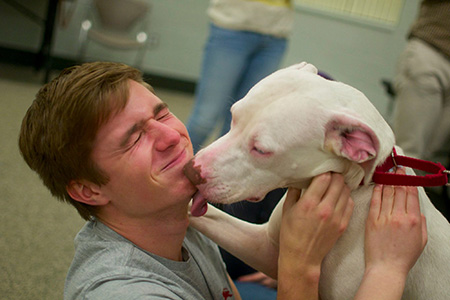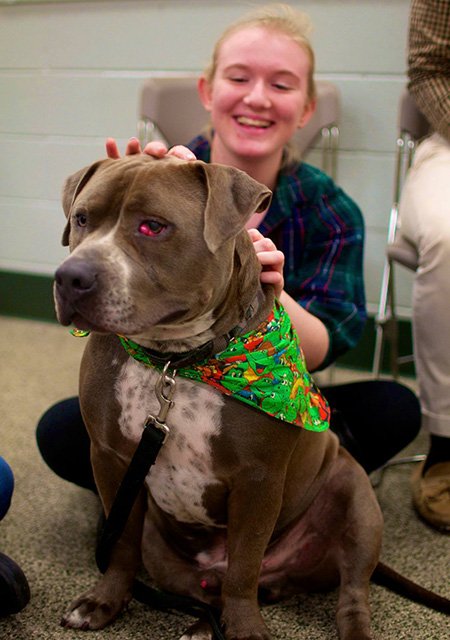Pit bull prejudice debunked in MSPCA visit

Samuel Chase ’18 plays with Indigo, a pit bull dog at the MSPCA animal shelter in Boston. (Photo by Monique Woo ’18)
A faculty member who regularly volunteers with dogs at a Boston animal shelter is teaching students about stereotypes toward pit bulls and the imagery the breed has evoked in popular American culture.
Jacqueline Romeo, who teaches American Popular Culture in the Institute for Liberal Arts and Interdisciplinary Studies, wrapped up the lesson by bringing her students face-to-face with rescued pit bulls at the MSPCA in Jamaica Plain, where she volunteers between 10 and 20 hours per week.
“Some of them had no experience with pit bulls,” Romeo said. “I wanted [them] to touch and see how affectionate and calm they can be, and to get over the stereotype of these dogs.”
“Her kindness and perseverance to help dogs reflects her amazing personality,” said Samuel Chase ’18, a Journalism major.
“It was really cool to see how loving the dogs actually were,” said Lauren Bennett ’18, a Journalism major. “They were just as outgoing and friendly as any other dog.”
The American Society for the Prevention of Cruelty to Animals (ASPCA) has a lengthy statement explaining its position on pit bulls.
“Don’t get me wrong, they can do a lot of damage,” Romeo said. “[But] they’re not inherently aggressive more than any other dog. They’re strong dogs, but so are others.”

Lauren Bennett ’18 gets close with Rhyno, a pit bull at the MSPCA shelter in Boston. (Photo by Monique Woo ’18)
Romeo said pit bulls have largely been demonized in the past two decades, as the breed grew popular in urban culture.
“You can trace the history,” she said. “In the ’90s, people were scared of Doberman Pinschers and Rottweilers.”
In Romeo’s class, students studied the cultural connections that pit bulls have developed between race, class, and gender, which included looking at the provocative CD covers of hip-hop artists such as Missy Elliot and DMX.
“What I find interesting is it has a pretty strong association with black masculinity,” she said. “It’s represented usually in poor communities, which sometimes happen to be communities of color. I’m interested in exploring that intersection.”
Romeo said there are several factors to consider in the rise of popularity and demonization of pit bulls—from dog fighting rings to people purchasing pit bulls in inner-city neighborhoods for protection, and then not properly socializing them.
“I think the students get it,” she said. “And this reinforced for them their ideas about what pit bulls are, and that breed discrimination is not right.”
Categories